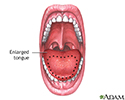Macroglossia
Macroglossia is a disorder in which the tongue is larger than normal.
Macroglossia is most often caused by an increase in the amount of tissue in the tongue, rather than by a growth, such as a tumor.
This condition can be seen in certain inherited or congenital (existing at birth) disorders, including:
- Acromegaly (buildup of too much growth hormone in the body)
- Beckwith-Wiedemann syndrome (growth disorder that causes large body size, large organs, and other symptoms)
- Congenital hypothyroidism (decreased production of thyroid hormone)
- Diabetes (high blood sugar caused by body producing too little or no insulin)
- Down syndrome (extra copy of chromosome 21, which causes problems with physical and intellectual functioning)
- Lymphangioma or hemangioma (malformations in the lymph system or buildup of blood vessels in the skin or internal organs)
- Mucopolysaccharidoses (a group of diseases that cause large amounts of sugar to build up in the body's cells and tissues)
- Primary amyloidosis (a buildup of abnormal proteins in the body's tissues and organs)
References
Alwani MM, Makki FM, Robbins KT. Physiology of the oral cavity. In: Flint PW, Francis HW, Haughey BH, et al, eds. Cummings Otolaryngology: Head and Neck Surgery. 7th ed. Philadelphia, PA: Elsevier; 2021:chap 86.
Rose E. Pediatric upper airway obstruction and infections. In: Walls RM, ed. Rosen's Emergency Medicine: Concepts and Clinical Practice. 10th ed. Philadelphia, PA: Elsevier; 2023:chap 162.
Sankaran S, Kyle P. Abnormalities of the face and neck. In: Coady AM, Bowler S, eds. Twining's Textbook of Fetal Abnormalities. 3rd ed. Philadelphia, PA: Elsevier Churchill Livingstone; 2015:chap 13.
Throat anatomy - illustration
Throat anatomy
illustration
Macroglossia - illustration
Macroglossia
illustration
Macroglossia - illustration
Macroglossia
illustration
Review Date: 4/28/2023
Reviewed By: Neil K. Kaneshiro, MD, MHA, Clinical Professor of Pediatrics, University of Washington School of Medicine, Seattle, WA. Also reviewed by David C. Dugdale, MD, Medical Director, Brenda Conaway, Editorial Director, and the A.D.A.M. Editorial team.








